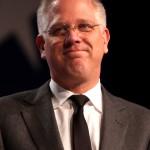The Fundamental Transformation of Glenn Beck
Posted on June 24, 2014 by Robert Ringer
Glenn Beck recently announced his latest “fundamental transformation of Glenn Beck” when he said, “I am in the final phase, I think, of a massive transformation. One that will take me to rough terrain, uncharted landscape and lonely woods. This may end up being the biggest and most important challenge of my life.”
So, what’s this latest Beckamation all about? Let’s back up a step or two and take a look at Beck’s evolution since 2006, when he left CNN for Fox News. The first year or so that he was on Fox, I never missed his show. He was nothing short of amazing.
Beck was the most naturally talented person I had ever seen on television — smart, knowledgeable, logical, great teacher, and funny as hell. And a remarkable actor as well, as he demonstrated when he put on a performance in “The Christmas Sweater” worthy of Laurence Olivier.
Beck performed a great public service every weekday by explaining, in terms everyone could understand, the evolution of the radical left — from Marx and Engels to Lenin and Trotsky … from Teddy Roosevelt and Woodrow Wilson to FDR and LBJ … from Mao and Ho Chi Minh to Castro and Che Guevara.
His material, and the entertaining manner in which he presented it, gave new meaning to the phrase “breath of fresh air.” Beck became the biggest, quickest television superstar I had ever witnessed, clearly annoying Fox faux conservatives like Dick Morris, Bernie Goldberg, and Bill Kristol, to name just a few.
He became so popular that all he needed to do was announce he was going to hold a rally in Washington, D.C. — without offering a decipherable explanation of what it was for — and a half million people showed up. I was there, and I can honestly say that, to this day, I don’t know what the point of the rally was, but the half million people in attendance were clearly mesmerized. Beck had transformed himself into a high priest of liberty.
Then, at the peak of his popularity, the man who reinvented himself from druggie-alcoholic-godless goof-off to clean-cut husband and father, devout Mormon, and history teacher to the masses suddenly announced it was “time to move on.” No more wasting precious moments exposing the sinister history and treachery of the radical left.
Fundamentally transforming himself and the theme of his show once again, Beck began to pretty much limit his guests to clergymen and religious scholars. Not that there’s anything wrong with having men of the cloth as guests on your show, but, as with most things he does, Beck went overboard. Personally speaking, I wasn’t looking to Glenn Beck for spiritual advice, and, judging from the way his ratings plummeted, apparently millions of other folks felt the same way.
Beck’s favorite spiritual guru was a scholar/minister by the name of David Barton, who heads up an organization called WallBuilders. There’s no question that Barton is a very knowledgeable man, but, quite frankly, he bored me to death with his nonstop, rapid-fire filibusters.
Beck did everything but salivate on Barton’s tie (though he may have even done that off camera), finally blurting out to his confused and bewildered audience that Barton was “the most important man in America.” Huh? Right then and there, I realized Beck had gone off the deep end. That was about the time I wrote my first article speculating that his days at Fox News were numbered.
But Beck still wasn’t through. His next fundamental transformation came when he simply sat on the edge of his desk for the entire hour of each show and gave what appeared to be an extemporaneous monologue. To be sure, it was pure genius that he could talk that long every day without so much as taking a deep breath, but, as could be expected, he, too, became boring. Too much of anything is too much.
Worst of all, Beck lost his wittiness. He wasn’t entertaining. He wasn’t engaging. He came across as totally self-absorbed, and viewers started opting out. I remember thinking how disappointed and sad I was that such an immense talent appeared to be self-destructing. I couldn’t help but wonder if his alcoholic tendencies had anything to do with his erratic behavior.
When he left Fox and fundamentally transformed himself yet again — this time into a media mogul — I didn’t follow him. I had no interest in finding out what GBTV was all about. He was no longer the Glenn Beck that had captivated me.
Now, suddenly, Beck is back on Fox News as a frequent guest (at least three times that I know of), even buttering up to pseudo-conservative Sean Hannity, who himself has long been on his way out the door at Fox. When Beck was in his prime, he never once so much as mentioned Hannity’s name, because he had no patience for Fox anchors who regularly featured such statist guests as John McCain, Lindsey Graham, and Mitch McConnell.
Now, in his mini-comeback with Fox, Beck has let it be known that he deeply regrets being so divisive in the past, and that he wants to spend the rest of his life helping us “come together.” In a recent article, he said, “I have challenged myself to let go of my anger and hurt and instead see others’ pain, need, confusion, and hurt.”
I don’t presume to know what’s inside Glenn Beck’s head, but I feel as though I’ve seen this movie before — i.e., the conversion of lifelong conservatives into “kinder and gentler” souls. It strikes me as somewhat strange that Beck can’t seem to accept success and just keep moving forward with the important moral issues he claimed to believe in. It’s almost as though he has an insatiable need to periodically shock everyone by suddenly changing course.
There’s no questioning the fact that, notwithstanding his mercurial nature, Beck’s genius has brought him from a life of drugs, alcohol, and dismal failure to the ranks of the rich and famous. But when he starts talking about “the final phase of a massive transformation” and helping people “come together,” you get the uncomfortable feeling that he’s headed for that grand fantasyland where “fairness” and “social justice” are code words for tyranny.
Why would anyone want to come together with people who believe in bigger government, more redistribution of wealth, and less freedom? The term “come together” is nothing more than a euphemism for compromise, and compromise is a euphemism for accepting “just a little bit of tyranny.” Why would any person of goodwill want to come together with someone who believes in an ideology that makes people worse off?
Best we all heed the warning of 17th century Jesuit priest Baltasar Gracian, who said, “Never open the door to a lesser evil, for other and greater ones invariably slink in after it.” How in the world do you come together when one side wants liberty and the other side wants tyranny? Sorry, Glenn, but the only solution to tyranny is to defeat it.
Speaking for myself, I don’t need to come together with anyone in order for me to “see others’ pain, need, confusion, and hurt.” I have always been sensitive to the pain of others, which is why I believe in the free market. That capitalism is by far the best way to alleviate human suffering is irrefutable.
It’s also why I never change my basic principles when it comes to not compromising with those who want to destroy the free market and employ force to make everyone equal. It doesn’t work. As Eric Hoffer said in Before the Sabbath, “To give equality to people who cannot be equal is to intensify their feeling of inequality.”
For me, so-called compassionate conservatism is libertarian-centered conservatism, not more redistribution of wealth. And a “kinder, gentler America” would be an America not where statists and freedom lovers come together and compromise, but where statists are thrown out of office and those who are not in office are prevented from violating the natural rights of others.
I wish Glenn Beck well, and I have my fingers crossed that he will not do anything that would further damage his legacy and strip him of his credibility with millions of people who still believe in him. Genius and an oversized ego can be a lethal combination, especially when someone has shown a tendency toward erratic behavior.










